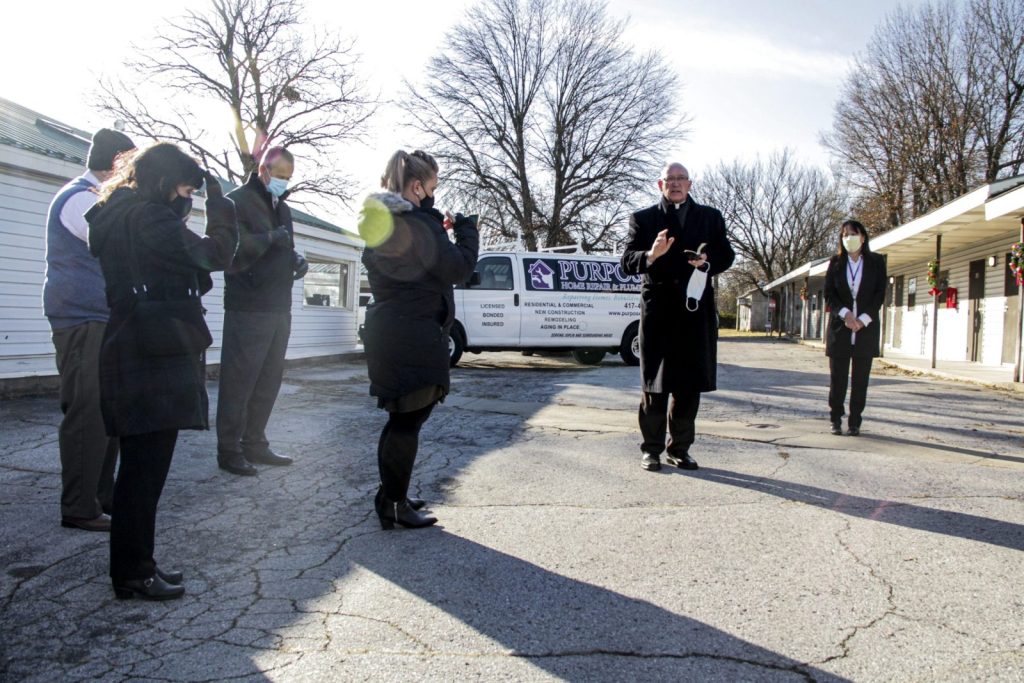During the height of the pandemic, the need for an emergency shelter for families became more critical than ever.
In the fall of 2020, just as winter weather was settling in, Catholic Charities of Southern Missouri partnered with O’Reilly Hospitality to turn an empty motel in northeast Springfield into the Rancho Emergency Shelter and Housing Program.
Initial funding for operations, maintenance and staffing was provided by the Greene County CARES ACT Relief Fund, and the program was really only intended to be open for six months.
But the need didn’t go away after six months, so Catholic Charities continued searching for funding and kept the shelter program in operation far beyond that six-month plan.
Two years and three months after the Rancho Emergency Shelter opened, the last of its residents moved out on Feb. 2.
All told, 57 households (163 adults and 183 kids) were sheltered at the Rancho, which is located at the corner of Glenstone Avenue and Kearney Street, and then permanently housed in the community through Catholic Charities’ housing programs like Rapid Rehousing and rental assistance from Community Development Block Grant (CDBG) funds.
“It was a prime example of how a community comes together to work a problem out,” said Ken Palermo, the new executive director of Catholic Charities of Southern Missouri.
Palermo was recently hired to lead the organization following the retirement of longtime executive director Maura Taylor last year.

At the time the Rancho Emergency Shelter and Housing Program was created, Palermo was serving as the deputy director of Missouri’s Department of Health and Senior Services Division of Community and Public Health, where he helped lead the state’s response to the COVID-19 pandemic. That’s also how he learned about the Rancho program.
“I’m familiar with it from the public health perspective because there were conversations about it at the state level,” Palermo said. “It was one of the first endeavors to work with those experiencing homelessness during the pandemic.”
Prior to opening the motel as an emergency shelter, many upgrades and renovations had to be made to the property, said John Lunardini, director of Social Enterprise and Facilities for Catholic Charities.
“We had lots of volunteers from the Knights of Columbus and other partners in the community come together and help us get the rooms painted, the rooms carpeted, beds installed,” Lunardini said, “with the understanding that we would only be open for the winter. Our idea was just the cold season — COVID and the cold.
“Nobody really knew what we were facing,” Lunardini said. “We were like, ‘Let’s get them through the winter.’ We opened a kind of a lean model that provided all the basic necessities.”
Later, Catholic Charities began seeking out other funding sources and Rachel Davis was hired to serve as the program manager.
Of the 16 rooms at the Rancho shelter, up to four were designated for unsheltered women who were being discharged from local hospitals but still needed a place to recuperate. Meals and case management were provided.
It was a 90-day program that gave families time to work with case managers to get stably housed within the community, Davis explained.

Asked if anyone was exited back into homelessness when the Rancho Emergency Shelter closed last week, Davis said no.
“Everyone was either provided other shelter opportunities or they were permanently housed,” she said.
John Farmer de la Torre, Catholic Charities’ director of communications and marketing, said everyone within the organization takes a lot of pride in knowing the Rancho program went far beyond what was initially planned.
“We were originally going to do it six months. We are at 27 months,” he said. “We are very proud to have been able to contribute so much. And so many people were involved. It’s just been a success. It’s something we are proud of.”
What’s next?
Catholic Charities of Southern Missouri applied for American Rescue Plan Act (ARPA) funds from Greene County in 2022 to extend the Ranch Emergency Shelter and Housing Program a few more months, but was not approved.
The shelter stayed open through the end of January until all residents could be moved into permanent housing or another shelter program, Davis said.
According to Davis, Lunardini and Palermo, Catholic Charities of Southern Missouri is very much interested in using the Rancho Emergency Shelter and Housing Program as a model to create a similar program for families who need emergency shelter and housing assistance. To do this, they hope to partner with another organization in this community for this project.
“I’m looking forward to having conversations with other folks in the community who are engaged in addressing those experiencing homelessness,” Palermo said on Friday, just a few days after arriving in Springfield. “I’m still learning who those folks are. But to know that there was a project here that went beyond its original intended lifespan — it quadrupled what was intended — shows not only the passion and expertise to be keepers of our brothers and sisters, but the ability to do it because of people like Rachel and John and everyone else in the organization.”
Lunardini said they are taking a hard look at the city’s recent announcement that it has about $5 million in American Rescue Plan Act funds to allow for the acquisition, construction or renovation of one or more buildings to create non-congregate shelters.
Non-congregate shelters are those that give families their own living spaces, similar to the Rancho Emergency Shelter and Housing Program.

